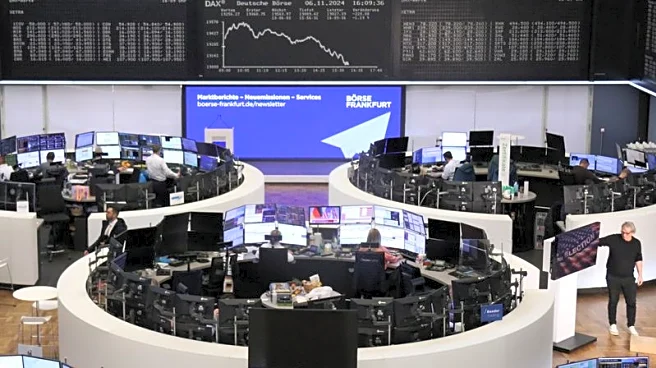What's Happening?
Xanadu Quantum Technologies, a Canadian quantum computing firm, is set to go public on the Nasdaq through a merger with Crane Harbor Acquisition, a blank-check firm, in a deal valued at $3.6 billion. The
announcement was made on Monday, with expectations to raise nearly $500 million through the SPAC deal, including a $275 million private investment in public equity. Quantum computing, which has the potential to solve complex problems beyond the capabilities of classical computers, has seen significant advancements this year. Major tech companies like IBM, Microsoft, and Google have been focusing on this technology, with Google announcing a breakthrough algorithm last month. Quantum computers utilize qubits, which can compute complex reactions in minutes, offering significant advantages in fields like medicinal and materials science.
Why It's Important?
The move by Xanadu to go public through a SPAC deal highlights the growing interest and investment in quantum computing technology. This sector is seen as a frontier for solving complex computational problems that classical computers cannot handle, potentially revolutionizing industries such as pharmaceuticals and materials science. The involvement of major tech companies and financial institutions like JPMorgan Chase, which has included quantum computing in a broader $1.5 trillion initiative, underscores the technology's potential impact on the economy and innovation. As quantum computing continues to develop, it could lead to significant advancements in various fields, driving economic growth and technological progress.
What's Next?
With Xanadu's public listing, the company is expected to further its research and development in quantum computing, potentially accelerating advancements in the field. The SPAC merger allows Xanadu to bypass the lengthy IPO process, providing quicker access to capital and public markets. As more quantum computing firms seek public listings, the industry may see increased competition and collaboration, driving innovation. Stakeholders, including tech companies, investors, and researchers, will likely monitor Xanadu's progress and its contributions to the quantum computing landscape.
Beyond the Headlines
The rise of quantum computing companies going public through SPAC mergers reflects a broader trend in the tech industry, where firms seek efficient ways to access capital and expand their operations. This approach allows companies to focus on innovation and development without the delays associated with traditional IPOs. The ethical and legal implications of quantum computing, such as data security and privacy, will become increasingly important as the technology becomes more prevalent. Long-term, quantum computing could reshape industries and societal norms, necessitating new regulatory frameworks and ethical considerations.











